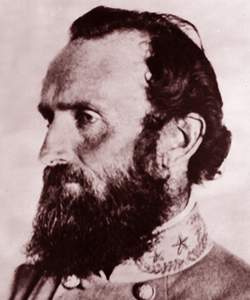Thomas Jonathan Jackson (American National Biography)
Scholarship
Jackson swept into war with cool professionalism and grim determination. He viewed the Civil War as a test of America by the Almighty: bloodshed would be terrible, but victory would come to the more devout side. Hence, Jackson carried into the conflict the faith of the New Testament and the ferocity of the Old Testament.
Following his appointment as colonel of infantry in April 1861, Jackson took charge of volunteers and militia defending the important outpost of Harpers Ferry. On 17 June he was promoted to brigadier general and assigned to lead a brigade of five regiments from western Virginia. The most famous nickname in the Civil War came to the general and his men a month later in the first major battle of the war (First Manassas). Federals were driving southern troops back in confusion when South Carolina general Barnard E. Bee sought to rally his broken lines. Pointing to the top of a hill that was the key to the battlefield, Bee shouted something to the effect of: "Look, men! There stands Jackson like a stone wall! Rally behind the Virginians!" Jackson's subsequent attack helped turn the tide and bring victory to the Confederates as well as fame and the sobriquet of "Stonewall" to himself.
Following his appointment as colonel of infantry in April 1861, Jackson took charge of volunteers and militia defending the important outpost of Harpers Ferry. On 17 June he was promoted to brigadier general and assigned to lead a brigade of five regiments from western Virginia. The most famous nickname in the Civil War came to the general and his men a month later in the first major battle of the war (First Manassas). Federals were driving southern troops back in confusion when South Carolina general Barnard E. Bee sought to rally his broken lines. Pointing to the top of a hill that was the key to the battlefield, Bee shouted something to the effect of: "Look, men! There stands Jackson like a stone wall! Rally behind the Virginians!" Jackson's subsequent attack helped turn the tide and bring victory to the Confederates as well as fame and the sobriquet of "Stonewall" to himself.
James I. Robertson, "Jackson, Thomas Jonathan," American National Biography Online, February 2000, http://www.anb.org/articles/04/04-00555.html.







